
What is SEO for Educational Website?
SEO for educational website is the art of making educational institution’s website (schools, colleges, universities) visible for search engines like Google, Bing.
By targeting search queries like “best business schools,” “online degree programs,” “top schools near me” SEO helps these institutions connect with students and parents.
SEO involves tasks like keyword research, website structure optimization, content creation and more that improves online visibility and engagement.
Educational institutions from primary schools to universities. SEO helps them to rank higher in search engine results pages (SERPs) and get discovered by their target audience.
Key areas within education that benefits from SEO:
- Primary Schools
- Preschool
- High School
- Colleges and Universities
- Technical and Vocational Schools
- Online Education Providers
- Educational Institutions
- Language Schools
- Test Preparation Centers
- Educational Non-Profits
If you want to improve your educational website and get more students, IMMWIT offers SEO services for school, college, private institutions and all educational sector websites to get optimized strategies that works.
Why Is SEO Important for Schools, Colleges, and Institutions?
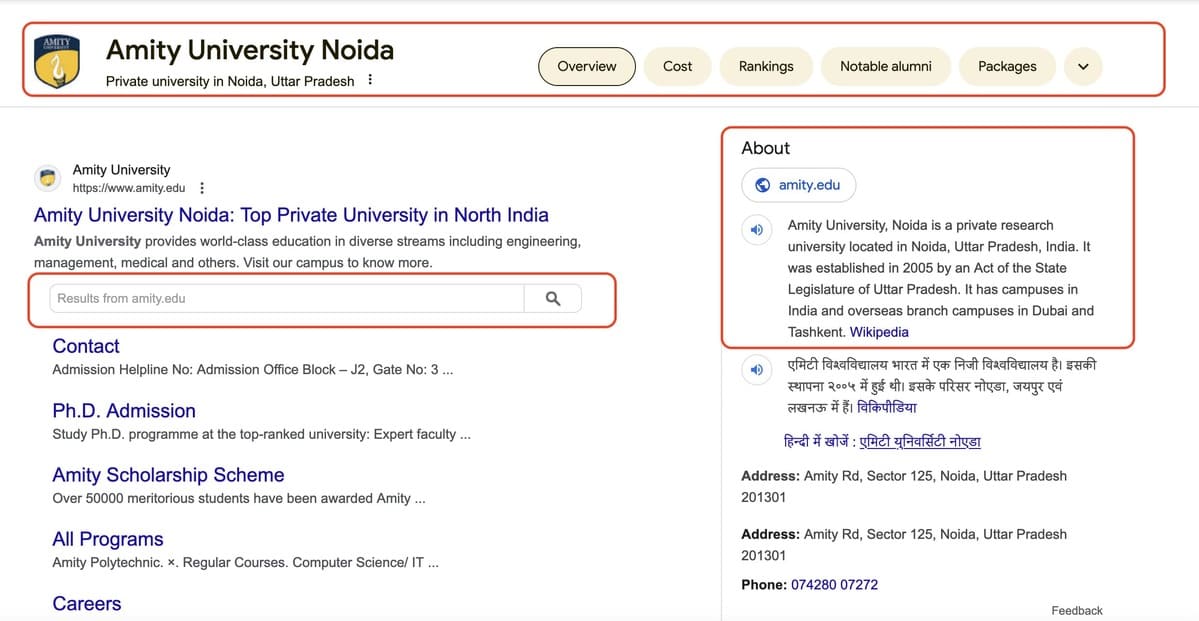
Search engine optimization (SEO) is important for educational institutions because it improves online visibility, attracts students, drives more traffic to the website, boosts search engine rankings
A well optimized SEO approach not only makes schools appear in relevant searches but also improves credibility and brand trust as users are more likely to engage with institutions that rank on the first page of search results.
So that students and parents can find your school, college or institution while searching for educational information, you need to have strong presence in search engine results.
- Increase Enrollment Rates: SEO attracts more prospective students, more chances of higher enrollment. It attracts more students, more application submissions and converts visitors to applicants.
- Competitive Advantage: Better online visibility sets the institution apart from others in education sector. It helps to stand out in a crowded education market, showcase unique programs and offerings and outrank other institutions in search results.
- Credibility and Reputation: Higher search rankings can boost the perceived authority and trust of the institution. This builds trust, establishes authority in specific academic fields and increases brand recognition.
- Organic Traffic: SEO brings non-paid website visitors, potentially more inquiries and applications. It reduces dependency on paid advertising and improves long term ROI on marketing efforts.
How is SEO Different in Education Sector?

SEO in education sector has its own challenges compared to regular SEO. Let’s see how it differs and what schools need to focus on.
Multiple campuses is a challenge for educational institutions. Each campus needs its own local SEO strategy. So that prospective students can find the right location easily.
Course pages is another challenge. Schools have many similar courses. They need to optimize each page without causing content duplication.
Local SEO for schools is important. They need to balance broad reach with local targeting. So that they can appear in search results for nearby educational options.
User experience is very important in education SEO. Your website should cater to students, parents and faculty. Each group has different needs and search intents.
Clear navigation is crucial. Prospective students should find program details, admission information and campus life easily. A confusing website can turn away potential applicants.
Research institutions and primary schools have different SEO needs. Research institutions focus on academic publications and specific study fields. Primary schools focus on local visibility and community engagement.
Keywords in education SEO are unique. It includes terms like “STEM programs” or “financial aid”. Location based keywords like “best universities in [city]” are common too.
As per RNL study 58% of high school students use college websites as their primary source of information. This proves how important is SEO for educational institutions.
Top 5 SEO Benefits for Schools

SEO is powerful for schools, colleges and private institutions in this digital age. It helps institutions to reach more students, improve online reputation and stand out in education sector. Let’s see the 5 key benefits of SEO for educational institutions.
1. Visibility and Organic Traffic
SEO makes schools appear higher in search results. This means more website visitors without paid ads. Organic search drives 53% of all website traffic, as per BrightEdge study.
Higher rankings means more clicks. The first organic result in Google search gets 31.7% of all clicks, as per Advanced Web Ranking.
2. Better User Experience
SEO optimizes website structure and navigation. So that students and parents can find information easily. A well organized site keeps visitors engaged longer.
Google considers user experience in rankings. Fast loading, mobile friendly sites rank higher. This benefits both users and search visibility.
3. Cost Effective Marketing
SEO gives long term results at a lower cost than paid ads. It gives better ROI over time. Organic search leads have 14.6% close rate compared to 1.7% for outbound leads, as per Search Engine Journal.
Schools can reduce their dependence on expensive traditional marketing methods. This gives them more budget for other important areas.
4. Credibility and Trust
Higher search rankings gives a school more authority. People trust websites that appear on the first page of search results. 75% of users never scroll past the first page of search results, as per HubSpot.
Quality content shows a school’s expertise. This builds trust with potential students and parents. It also aligns with Google’s E-E-A-T guidelines.
5. Targeted Reach
SEO allows schools to target specific demographics and locations. This helps to attract the right students for each program. Local SEO is more important for schools with physical campuses.
Keyword research reveals what potential students are searching for. This insight helps schools tailor their content and offerings to meet student needs.
Boost Your School Online Presence with SEO
9 SEO Tips For Schools, Colleges, and Institutions to Rank on Google #1 Position
Get more visibility for your educational institution with these SEO tips. Learn how to get your school website on 1st page of Google.
Find out the key elements of SEO for schools, colleges and universities. These SEO tips will help you stand out in search and connect with your target audience.
1. Explore Educational Search Intent
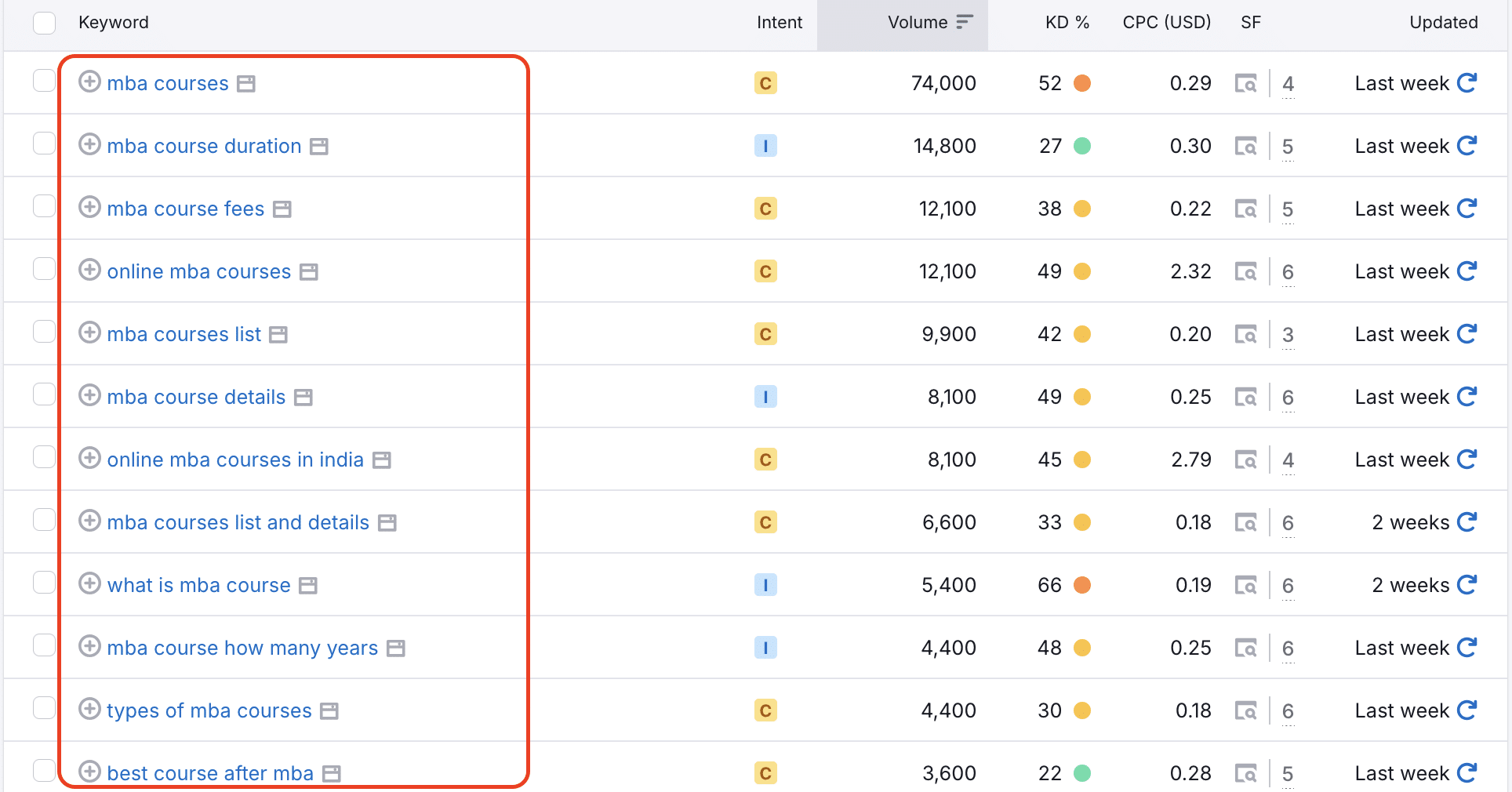
What do students search online is important for effective SEO for school, college or private institute . Search intent reveals the purpose behind the query, so you can create content that meets student needs.
Search intent has four main types:
- Informational: Students are looking for answers or information. For example: “What is a liberal arts degree?”
- Navigational: Users are looking for a specific website or page. For example: “Noida International University admissions page”
- Transactional: People want to take an action. For example: “Apply to Amity University online”
- Commercial: Searchers are comparing options before deciding. For example: “Best engineering schools in the India”
To find search intent, use tools like Google Search Console or SEMrush. These will show you the actual queries that are leading to your site.
Match your content to search intent for better rankings. For informational queries, create detailed guides. For navigational, make site navigation easy. For transactional, streamline application process. For commercial, highlight your USP.
For Example: If many search for “engineering scholarships,” create a guide to engineering scholarships at your institution.
2. Perform Keyword Research for Schools, Colleges, and Universities
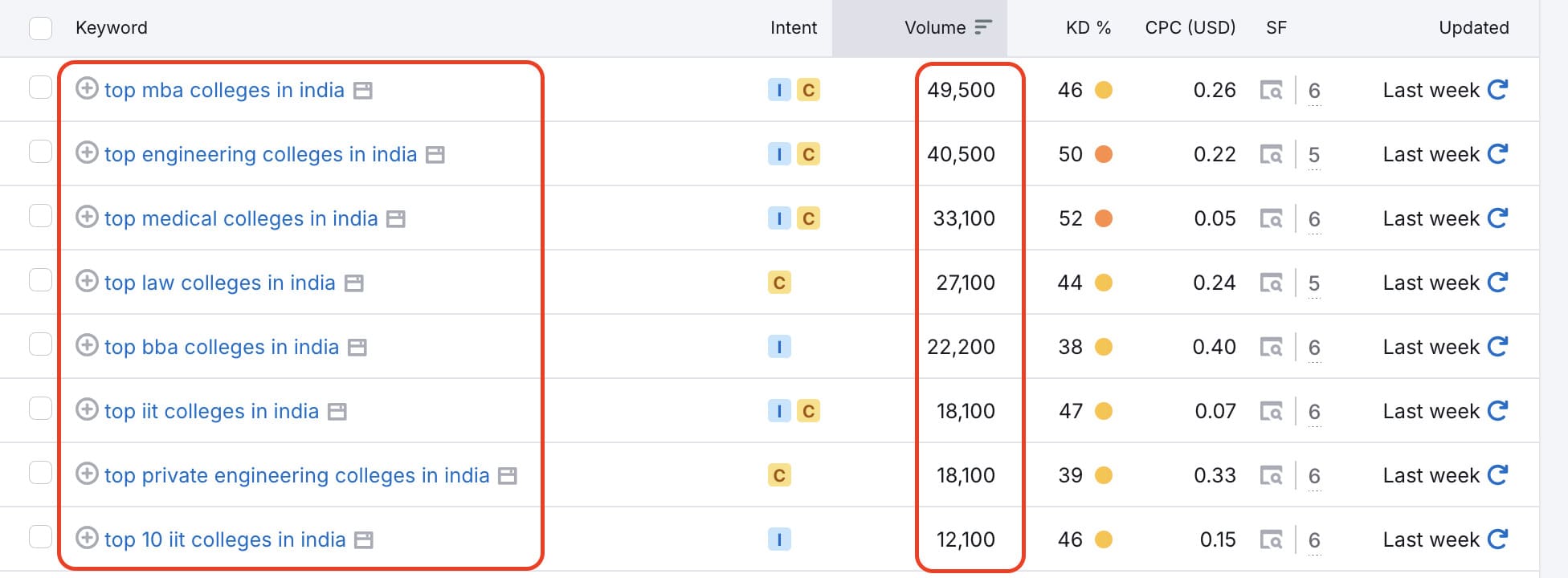
Keyword research is important for education SEO. It helps you find the terms that students use when searching for schools, colleges or private institute like yours.
Focus on specific program keywords. For schools, use “advanced math class near me” instead of “math class”. Colleges might target “degree courses after 12th science” instead of “college degree”. Private institutions could use “exclusive business leadership program” instead of “business program”.
Long-tail keywords are important. They are more specific and less competitive. A high school might use “top-rated private high school in Noida”, while a college could target “affordable engineering college with internship opportunities”.
For local SEO, include location keywords like: “boarding schools in Delhi” or “top colleges in Delhi”. This is important for institutions with physical campuses.
Think of keywords related to your institution’s USP. This could be “school with small class sizes”, “college with strong alumni network” or “institution offering merit-based scholarships”.
SEO for Schools: Picking the Right Keywords
When you’re trying to get your school noticed online, choosing the right keywords is super important. Think about what parents and students might type into Google when they’re looking for a school like yours. Here’s a handy list to get you started:
- “Best private school in [your city]”
- “[Your city] private school”
- “High school in [your city]”
- “Best high school for sports”
- “Top academic high school [your city]”
- “Best elementary school near me”
- “Top preschool [your city]”
- “All-boys school [your area]”
- “Girls’ high school [your region]”
Don’t forget to think local! Add your city or area to many of your keywords. This helps you show up when parents are searching for schools nearby.
3. Identify Your Target Audience
Understanding your target audience is important for education SEO. Here’s how to define and understand demographics, interests and search behavior of potential students:
Analyze Existing Data
Start with what you have. Dig into your enrollment records and website analytics. Look for:
- Review enrollment records for demographics
- Analyze website analytics to understand user behavior
- Popular academic programs and extracurricular activities
This will give you a baseline of who’s already interested in your institution.
Market Research
Go straight to the source. Get insights from current and prospective students through:
- Surveys, focus groups and interviews
- Ask about online behavior and search preferences
- How students search for academic programs
Ask about their online behavior and how they search for academic programs. This is gold for your SEO strategy.
Analytics Tools
Use tools like Google Analytics to track site traffic and user behavior. Look at:
- Site traffic and user behavior
- Which age groups are most active on your site
- Which region most of your traffic comes from
- Which pages get the most visits
These will give you an idea of what content works with your audience.
Audience Segments
Based on your research, create audience segments.
- Undergraduate vs postgraduate students
- Local vs international students
- Traditional students vs working professionals
Tailor your content to these segments to improve SEO. Update your audience profiles regularly to keep your strategy relevant.
4. Create Pages for Different Courses, Programs, and Degrees

Organize your content to match specific search queries for each course or program. Use clear and descriptive headings and include all information about each offering. This will help search engines understand and rank your pages better.
What to include on each page:
- Program overview and objectives
- Curriculum details
- Admission requirements
- Career prospects
- Faculty profiles
- Student testimonials
Optimize for different search intents. For informational queries, provide detailed program descriptions. For transactional intent, include “Apply Now” or “Request Information” buttons. For commercial intent, provide comparison information.
Implement internal linking. Link related programs to each other and course pages to relevant department or school pages. Use descriptive anchor text for internal links to improve navigation and SEO.

A typical course page might look like:
- Course title and brief overview
- Key program features
- Curriculum breakdown
- Admission requirements
- Career opportunities
- Faculty highlights
- Student success stories
- Application process
- Related programs
5. Optimize Website Content for Your Target Audiences

Tailoring your content to your target audience is important for education SEO. Here’s how to optimize your website content for students:
Use target keywords in your text, headlines and meta descriptions. Aim for 1-2% keyword density to avoid over-optimization.
Create content that answers questions. Answer FAQs about admissions, campus life and academic programs. This will increase your chances of getting featured snippets.
Simplify academic speak. Use clear and simple English that students and parents can understand.
You can include testimonials and success stories on your website. Real life examples will help students imagine themselves at your institution.
Optimize your content structure:
- Use descriptive headings (H1, H2, H3) to break up text
- Keep paragraphs short (3-4 sentences max)
- Use bullet points for scannability
Use Hemingway Editor to improve readability. Aim for a reading level for your target audience.
A/B test to optimize for conversions. Test different headlines, CTAs and page layouts to see what works best with your audience.
6. Structure Your Website and Fix Technical Issues
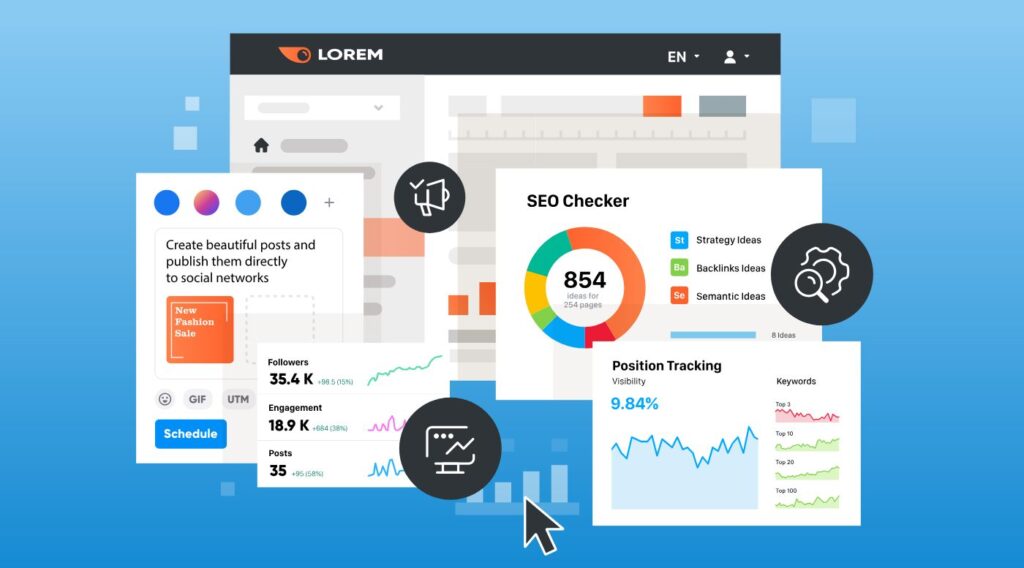
To improve your education website visibility and rankings implement these website structure and technical SEO fixes:
Website Structure
A well structured website helps users and search engines to navigate your content better. You can implement these:
- Navigation menu: Main sections are logically ordered
- URL structure: Site structure is reflected in URLs
- Breadcrumbs: Users know where they are on the site
- Footer links: Important pages are easily accessible
- Category pages: Related content is grouped together
- Search: Users can find specific information quickly
- Strategic CTAs: Clear CTAs for key conversions (e.g. “Apply Now”, “Request Information”)
- Above the fold: Important information and CTAs are visible first
- Consistent design: Design is the same across pages for user experience
Indexability
Make sure your site is crawlable by search engine spiders. Proper indexing is important for your pages to show up in search results:
- Robots.txt: Control which pages can be crawled. Put this file in your root directory
- Canonical tags: Use for pages with multiple versions. Implement with rel=”canonical” link tag in the HTML head
- Meta tag directives: Use noindex and nofollow to prevent indexing of irrelevant content
- XML sitemaps: Submit to search engines for indexing
- Hreflang tags: Use for multilingual content to specify language versions
Crawlability
Make your website crawlable. Efficient crawling means search engines can find and index your content better:
- Internal linking: Site structure is logical. Important pages should be reachable within 3-4 clicks from the homepage
- No orphan pages: All important pages are linked from somewhere
- Use descriptive anchor text: Search engines can understand link context
- Pagination: Implement correctly. Use rel=”next” and rel=”prev” for multi-page content
Technical SEO
Fix these technical issues to improve your website performance and user experience which can impact your search rankings:
- HTTPS: Secure and rank better
- Page speed: Use Google PageSpeed Insights to find and fix issues
- Mobile friendly: Use Google’s Mobile Friendly Test tool
- Fix broken links: Regularly audit and fix internal and external links
- Duplicate content: Use canonical tags or 301 redirects
- Image optimization: Compress and use alt text
- Browser caching: Improve load times for returning visitors
- Minify CSS, JavaScript, HTML: Reduce file sizes and DOM size
- CDN: Improve load times for global audience
7. Build High-Quality Authority Backlinks

Backlinks is the backbone of educational website. They help establish your school authority and credibility in search engine results. Here are ways to get high authority backlinks for your website:
- Guest blogging: Write for other reputable sites related to your programs or region.
- Scholarships: Offer scholarships to students and promote on other relevant sites.
- Alumni outreach: Ask alumni to link to your site from their personal or professional pages.
- Faculty contributions: Encourage faculty to share articles and research on respected platforms.
- Partnerships: Collaborate with other schools on projects or events.
- Local SEO: Provide expert commentary or articles to local media.
- Resource creation: Create valuable content like guides or research papers that others will link to.
Quality over quantity in backlink building for schools. Focus on getting links from .edu domains and industry publications. These high authority backlinks carries more weight in search engine rankings.
Do community outreach and sponsor local events. This can lead to natural backlinks and boost your local SEO and visibility in search results.
Regularly check your backlink profile. Find and disavow low quality links to keep your profile healthy and avoid potential penalties from search engines.
8. Optimize for Local SEO

Local SEO helps Indian colleges and universities to attract students from nearby areas. Here are the ways to improve your local search visibility:
Use local content on your website. Mention city or state along with program related keywords. For example “Best Engineering College in Mumbai” or “Top MBA Program in Delhi NCR”.
Create pages about your local area. Talk about nearby places, events and student life. This shows your connection to the place and helps you to rank for local searches.
Ask current students and alumni to review you. Positive reviews on Google, Facebook and education specific platforms will improve your visibility in search results.
Optimize your Google Business Profile (GBP):

- Claim your GBP if it exists, else create a new one
- Fill in accurate information (name, address, phone number)
- Choose the most relevant category (e.g. university, private college)
- Add photos and videos of your campus and facilities
- Reply to reviews promptly and professionally
For multi campus institutions, create separate GBP for each campus. Ensure the information is consistent across all profiles and your website.
Participate in local events and create content around them. This will generate local backlinks and improve your local SEO.
9. Create Video and Useful Resources
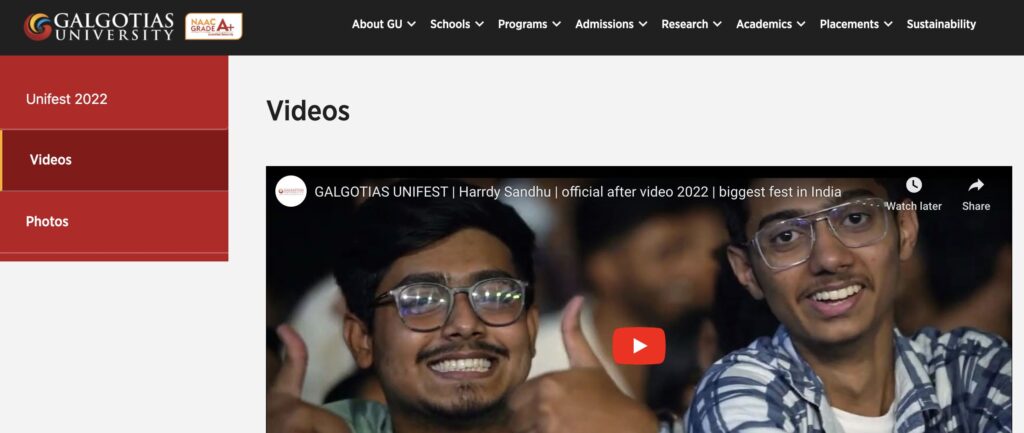
Video content can do wonders for educational institutions. It engages students and improves your search engine rankings. Here’s how to use video for your school SEO:
Create different types of video content:
- Campus tour videos
- Student testimonials
- Faculty interviews
- Course previews
- Webinars on popular topics
Create an advice section on your website to address students’ common queries. This will improve your SEO by:
- Targeting long-tail keywords naturally
- Increasing dwell time on your site
- Positioning your institution as an authority
Format your advice content with headings and short paragraphs. Talk about choosing a major, campus life and career preparation.
Create a comprehensive FAQ page to answer students’ common queries. This will help your school SEO by:
- Increasing your chances of getting featured snippets
- Addressing user intent directly
- Reducing bounce rates
Categorize your FAQs for easy navigation. Update this section regularly based on new queries from students.
Create an “Ask The Expert” section to provide personalized answers. This will help your SEO by:
- Generating fresh and unique content regularly
- Encouraging user engagement
- Building trust and authority
Feature different faculty members or staff experts to answer questions in their areas of expertise. You can use video responses for a more personal touch.
Take Advantage of School SEO Companies

SEO for educational institutions is complex. School SEO companies offer expertise that can help you to boost your online presence. Here’s why you should work with education SEO services:
Education-Specific Expertise: School SEO companies know the education sector inside out. They know how to target prospective students, parents and other key audiences.
Time and Resource Savvy: Outsourcing SEO allows your staff to focus on core educational activities. SEO professionals can manage your online strategy better.
Up to Date SEO: SEO companies are updated with the latest algorithm changes and best practices. Your school website will stay ahead in search rankings.
Professional SEO Company offer full services:
- Keyword research for educational queries
- On-page optimization for school websites
- Content strategy to attract students
- Link building with education authorities
Measurable Outcomes: SEO companies provide you with detailed analytics and reports. You can track your search engine rankings and website traffic.
Competitive Advantage: In a competitive education market, professional SEO can help you to stand out. Increased visibility means more student applications and enrollments.
When selecting an SEO company, look for one with experience in education sector. Ask for case studies and client references to make sure they can deliver for your institution.
Common Mistakes to Avoid for Educational SEO
To improve your school SEO avoid these common mistakes:
Ignoring Mobile Optimization: Most schools neglect the mobile friendly website. 63% of organic search engine visits come from mobile devices. A responsive design is essential for your SEO.
Outdated Content: Keeping old course pages live and not updating content regularly can harm your SEO. Search engines love fresh and relevant content. Review and update your website information regularly.
Ignoring Local SEO: For schools, local SEO is key. Not claiming your Google My Business listing and not using local keywords can mean missing out on students from your area.
Keyword Stuffing: While keywords are important, overusing them can get you penalized. Make sure natural keyword integration in your content. Focus on creating valuable content for your audience.
Low Quality Backlinks: Relying on low authority links or missing out on high quality backlink opportunities can harm your SEO. Partner with other education institutions and organizations for quality backlinks.
Ignoring Site Speed: Slow pages annoy users and hurt SEO. Optimize images, minimize code and use a reliable hosting service to speed up your site.
Poor Internal Linking: Not linking related pages on your site makes it hard for search engines to understand your site structure. Implement internal linking strategy.
Not writing Meta Descriptions: Not writing meta descriptions means missing out on CTR from search results.
Develop a Powerful SEO Blueprint for Your Educational Institution
A robust SEO strategy for educational institutions encompasses several key elements. These include thorough keyword research, engaging content creation, technical SEO optimization, and local SEO tactics.
To enhance your institution website for search engines and prospective students, leverage powerful tools for keyword analysis and site audits. These tools provide valuable insights to improve your search engine visibility.
Effective SEO can significantly boost student attraction, alumni engagement, and lead generation for educational institutions. Consider professional SEO services to maximize your online presence and achieve your enrollment goals.






